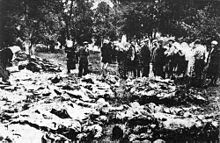Tingkat kematian di Uni Soviet di bawah kepemimpinan Josef Stalin

Perkiraan jumlah kematian yang disebabkan oleh Joseph Stalin sangat bervariasi. Konsensus ilmiah menegaskan bahwa bahan arsip yang dideklasifikasi pada tahun 1991 mengandung data yang tak terbantahkan jauh dan lebih unggul dari sumber yang digunakan sebelum tahun 1991 seperti pernyataan dari emigran dan informan lainnya.[1][2] Beberapa penulis dan jurnalis berpendapat bahwa "statistik tidak pernah dapat sepenuhnya menggambarkan apa yang terjadi".
Sebelum Pembubaran Uni Soviet dan pengungkapan arsip, beberapa sejarawan memperkirakan bahwa jumlah yang dibunuh oleh rezim Stalin mencapai 20 juta jiwa lebih.[3][4][5] Setelah Uni Soviet dibubarkan, bukti dari arsip Soviet dibuka dan peneliti diizinkan untuk mempelajarinya. Arsip-arsip ini berisi catatan resmi dari 799.455 orang (1921–1953),[6] mencakup sekitar 1,7 juta kematian di Gulag,[7][8] sekitar 390,000[9] kematian selama dekulakisasi pemindahan paksa, dan hingga 400.000 kematian orang dideportasi selama tahun 1940-an,[10] dengan total sekitar 3,3 juta korban yang tercatat secara resmi dalam kategori ini.[11] Menurut sejarawan Stephen Wheatcroft, sekitar 1 juta dari kematian ini dilakukan "sengaja" sementara sisanya terjadi karena kelalaian dan lepas bertanggung jawab. Korban keseluruhan mencapai 5,5 hingga 6,5 juta[12] orang selama berlangsungnya bencana kelaparan 1932-33 turut terhitung sebagai korban era Stalin.
Referensi
[sunting | sunting sumber]- ^ Wheatcroft, Stephen (1996). "The Scale and Nature of German and Soviet Repression and Mass Killings, 1930–45" (PDF). Europe-Asia Studies. 48 (8): 1334, 1348. doi:10.1080/09668139608412415. JSTOR 152781.
The Stalinist regime was consequently responsible for about a million purposive killings, and through its criminal neglect and irresponsibility it was probably responsible for the premature deaths of about another two million more victims amongst the repressed population, i.e. in the camps, colonies, prisons, exile, in transit and in the POW camps for Germans. These are clearly much lower figures than those for whom Hitler's regime was responsible.
- ^ Healey, Dan (2018-06-01). "Golfo Alexopoulos. Illness and Inhumanity in Stalin's Gulag". The American Historical Review. 123 (3): 1049–1051. doi:10.1093/ahr/123.3.1049. ISSN 0002-8762.
New studies using declassified Gulag archives have provisionally established a consensus on mortality and “inhumanity.”
- ^ Robert Conquest. The Great Terror. NY Macmillan, 1968 p. 533 (20 million)
- ^ Anton Antonov-Ovseyenko, The Time of Stalin, NY Harper & Row 1981. p. 126 (30–40 million)
- ^ Elliot, Gill. Twentieth Century Book of the Dead. Penguin Press 1972. pp. 223–24 (20 million)
- ^ Seumas Milne: "The battle for history", The Guardian. (12 September 2002). Retrieved 14 July 2013.
- ^ Haynes, Michael (2003). A Century of State Murder?: Death and Policy in Twentieth Century Russia. Pluto Press. hlm. 214–15. ISBN 978-0745319308.
- ^ Applebaum, Anne (2003) Gulag: A History. Doubleday. ISBN 0767900561 pp. 582–583.
- ^ Pohl, J. Otto (1997). The Stalinist Penal System. McFarland. hlm. 58. ISBN 0786403365.
- ^ Pohl, J. Otto (1997). The Stalinist Penal System. McFarland. hlm. 148. ISBN 0786403365. Pohl cites Russian archival sources for the death toll in the special settlements from 1941–49
- ^ Wheatcroft, Stephen G. (1999). "Victims of Stalinism and the Soviet Secret Police: The Comparability and Reliability of the Archival Data. Not the Last Word" (PDF). Europe-Asia Studies. 51 (2): 315–45. doi:10.1080/09668139999056.
During 1921–53, the number of sentences was (political convictions): sentences, 4,060,306; death penalties, 799,473; camps and prisons, 2,634397; exile, 413,512; other, 215,942. In addition, during 1937–52 there were 14,269,753 non-political sentences, among them 34,228 death penalties, 2,066,637 sentences for 0–1 year, 4,362,973 for 2–5 years, 1,611,293 for 6–10 years, and 286,795 for more than 10 years. Other sentences were non-custodial
- ^ Davies,; Wheatcroft (2009). The Industrialisation of Soviet Russia Volume 5: The Years of Hunger: Soviet Agriculture 1931–1933. Palgrave Macmillan. hlm. 401. ISBN 978-0230238558.
